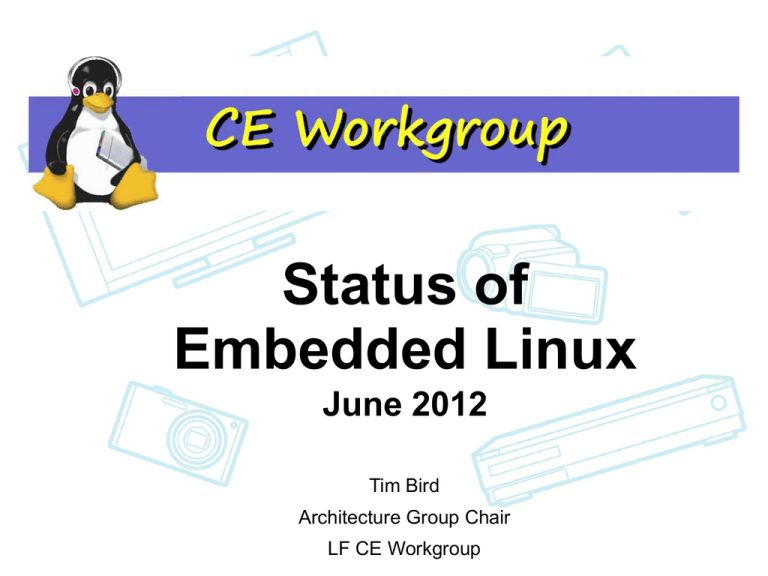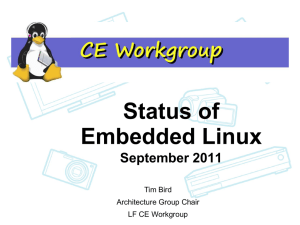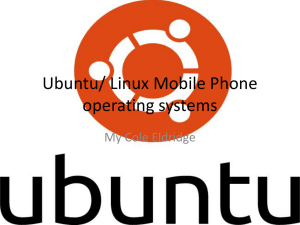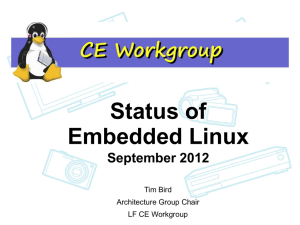Status-of-Embedded-Linux-2012-06-JJ41
advertisement

Status of Embedded Linux Status of Embedded Linux June 2012 Tim Bird Architecture Group Chair LF CE Workgroup Outline Kernel Versions Technology Areas CE Workgroup Projects Other Stuff Resources Outline Kernel Versions Technology Areas CE Workgroup Projects Other Stuff Resources Kernel Versions • • • • • • • Linux v2.6.39 – 19 May 2011 – 66 days Linux v3.0 – 21 July 2011 – 63 days Linux v3.1 – 24 Oct 2011 – 95 days • Larger due to kernel.org breakin Linux v3.2 – 4 Jan 2012 – 72 days Linux v3.3 – 18 Mar 2012 – 74 days Linux v3.4 – 20 May 2012 – 63 days Linux v3.5-rc2 – 9 June 2012 … • (Maybe 3.5 at start of August) Linux v2.6.39 • • • Pstore • • • Store information from dying kernel into some persistent storage Similar to mtdoops or ramoops See http://lwn.net/Articles/434821/ Device power domains for runtime PM ARM arch tree changes (just starting) Linux v3.0 • • • • Fast symbol resolution for module loading • Binary search instead of linear lookup for module linking POSIX alarm timers • • Similar to Android Alarm Timers See http://lwn.net/Articles/429935/ BKL function calls are now gone More ARM arch tree changes Linux v3.1 • • • Watchdog timer core New framework for handling power management domains was added • See driver/base/power/domain.c Multiple ARM SoCs now have device tree support Linux v3.2 • • • New pin control subsystem • • • Allows control of multiple pins as named groups, with multiplexing See Documentation/pinctrlt.xt See ELC 2012 talk by Linus Walleij devfreq – DVFS for non-cpu devices PM QOS now supports per-device constraints • • See Documentation/power/pm_qos_interface.txt See http://lwn.net/Articles/466230 Linux v3.3 • • • • ARM large physcial address extensions • See Catalin Marinas talk at ELC Europe 2011 ALSA support for compressed audio New “charger manager” subsystem • Can partially resume to poll battery and resuspend Android patches in staging • • This is really cool Please don’t use any interfaces from code in staging!! Linux v3.4 • • • Universal Flash Storage host controller drivers • See Documentation/scsi/ufs.txt Common clock framework • • Unifies handling of subsystem clocks See Documentation/clk.txt HSI (High-speed synchronous serial interface) framework • Used for communication between CPU and cellular modem engines Linux v3.4 (continued) • • DMA buffer sharing API Remoteproc subsystem • • • Allows for control of other CPUs through shared memory Rpmsg is a new mechanism for communicating with other CPUs (running non-Linux) See Documentation/remoteproc.txt and rpmsg.txt Linux v3.5 (probable) • • • Kernel log rework • • Structured printk (new format), with tags http://lwn.net/Articles/492125/ Support for writing NFC drivers Integration of ramoops and pstore • Part of work to support Android ram_console Things to watch • • • • Device trees Android features Big/Little Single kernel image for ARM • • Result of lots of device tree and ARM refactoring work See LinuxCon Japan talk by Deepak Saxena Outline Kernel Versions Technology Areas CE Workgroup Projects Other Stuff Resources Bootup Time • • • Not so much a kernel problem any more • • Lots of previous talks and presentations Good kernel techniques on eLinux wiki • Kernel should provide features for overall performance • http://elinux.org/Boot_Time User-space is big problem area now See presentation by Andrew Murray at ELC Europe 2010 • Very good philosophy of boot time reduction • Bootup time work = re-specialization of software Bootup Time technologies • • Bootloader improvements • U-Boot ARM caching enhancements Snapshot boot • • • Old topic, but still very popular Requires work both inside and outside kernel • Not much mainlined See ELC 2011 presentation by Kang Dongwook Graphics • • 3D • OpenGL ES is de-facto standard everywhere 2D • • • Android had Skia, but is moving to HWUI Other platforms can use Clutter, Qt, and X Framebuffer is going away, with acceleration required for larger screens Graphics (cont.) • • • Lots of work around memory management between kernel, user-space and GPU Android has /dev/ion • • A unified approach to buffer management and sharing between display, GPU, camera, codecs, etc, new in Ice Cream Sandwich Replacement for pmem Mainline has Contiguous Memory Allocator (CMA) and dma-buf • • http://lwn.net/Articles/468044/ - CMA http://lwn.net/Articles/470339/ - dma-buf Accelerated rendering • • Accelerated rendering is a big topic • Google introduced renderscript • Uses LLVM to do runtime retargeting of script to whatever capabilities device has Ability to support GPU in SOC is very important Graphics Drivers • • PowerVR graphics driver • • PowerVR is being used lots of places • • Intel adopted for Cedarview and it's already in Sodaville Is in very many ARM SOCs PowerVR driver is closed-source No clear way to pressure ImageTech or write community driver Multimedia • Gstreamer • Is still being used in TVs • Stagefright – new media layer • WebM/VP8 • • Ex: Google TV uses it Android media layer • • Replaces OpenCore? Codec wars • • Free codec by Google Integrated into HTML5 File Systems • • • • UBIFS • • Replacing JFFS2 as default raw flash FS of choice Still needs some boot time improvements YAFFS2 is not in mainline yet • Despite CELF funding LogFS • Appears to be abandoned AXFS • • Advanced XIP File system – developed by Intel/Numonyx but never mainlined Sony uses this File Systems (cont.) • • Google using Ext4 on eMMC on current Android devices • No more raw NAND flash Want to optimize Linux block filesystem layers for flash • • See Arnd Bergmann's talk at ELC Europe 2011 on filesystem performance on cheap flash media See Ken Tough’s ELC 2012 talk Power Management • • • Runtime Power Management • • Relatively new ability to suspend and resume individual system components See http://lwn.net/Articles/347573/ See Magnus Damm’s slides at: http://elinux.org/ELC_2011_Presentations Device power domains • • Set of devices sharing power resources (clocks, power planes, etc.) See Rafael Wysocki’s talks at LinuxCon Japan 2011 and ELC Europe 2011 Power Management • New attempt at wakelock-compatible solution by Rafael Wysocki • • • • “Autosleep and wakelocks” http://lwn.net/Articles/479841/ Rafael: “This series tests the theory that the easiest way to sell a once rejected feature is to advertise it under a different name” Appears to be generating less heated discussion System Size • • Good talks recently: • • Xi Wang at ELC 2011 about optimizing memory usage throughout the system Darren Hart at ELCE 2011 – poky-tiny User space is memory problem area now • OOM killer or OOM avoidance is big issue • • Cgroup memory notifications Android has it's own low memory killer • Application lifecycle is key feature Outline Kernel Versions Technology Areas CE Workgroup Projects Other Stuff Resources CEWG Contract Work 2011 • • • • • • • • Mainline fast symbol resolution Mainline Device Firmware Upgrade (DFU) code in U-Boot Work on Linux tiny patches Improve UBIFS mount time Flash filesystem testing Mainline the watchdog framework Extend bluetooth stack Kernel trace and debug documentation Contract Work Details • Mainline fast symbol resolution • Mainline DFU code in U-Boot • • • • • Change symbol lookup to use binary search instead of linear scan to speed up module loading Already mainlined (Linux v3.0) Device Firmware Upgrade (DFU) is an industry standard for upgrading and manipulating firmware in embedded devices Mostly mainlined in u-boot and kernel Work on Linux tiny patches • • • • Revive Linux-tiny patch set Forward-port patches to latest kernel Add more patches to improve kernel configurability Last work was with function-sections for kernel Contract Work Details (2) • Improve UBIFS mount time • • • Add logging or checkpointing to UBI to avoid bad-block scan of whole device on UBI attach Series fo “fastmap” patches submitted over last few months Flash filesystem testing • • • Publish performance results for each new kernel version Lots of great data – charts and graphs! Check out: http://elinux.org/Flash_Filesystem_Benchmarks Contract Work Details (3) • • Mainline the watchdog framework • • Provides a generalized watchdog mechanism • Should provide easier method to add watchdogging to drivers and the kernel going forward Mainlined in 3.1 Extend bluetooth stack with Remote SIM Access protocol • • • Allows for Linux bluetooth and telephony stack to utilize SIM in external device for operation Primary use is for Linux-based in-car system to utilize SIM in mobile device for telephony Mainlined in upstream bluez and kernel Long-term Projects • • Android mainline project Long Term Support Initiative (LTSI) Android Mainline Project • • • • Mainline Android kernel features • Goal is to incrementally reduce diff between Android and mainline kernels Interesting discussion at kernel summit • • Would be nice to support Android with mainline kernel Linus – we’ve taken sub-optimal stuff before Multi-party effort to mainline patches • • CE WG, Linaro, and others Greg KH put some files into drivers/staging Good meeting at Linaro Connect in February Android mainline status • 3.3 kernel (with 12 lines of patches) boots AOSP • • • Some pieces missing: wakelocks, network security, Android USB gadget Work is needed to move items from staging to fully mainlined Some work recently on • • • Logger Ram console Led timers Long Term Support Kernel for Industry • CE Workgroup is initiating a new project for companies to collaborate on maintaining a kernel version for embedded products • • • Similar to long-term kernel maintained in enterprise space Based on community long-term tree See presentation by Hisao Munakata at LinuxCon Japan LSTI reasons • Various effects contribute to low contribution rate from consumer electronics product teams • • Version gap, product schedule impedance mismatch with mainline releases, focus on short-term rather than long-term solutions Want to create an area for collaboration between companies, as well as a staging ground for moving code to mainline LTSI project overview • Project consists of three parts Kernel Mainline Bug fixes (Linux-Next) long-term stable tree Kernel.org (Greg K-H) Staging tree Feature back-porting Upstream support Industry staging tree CE WG LTS Industry tree Features LTSI Staging tree Industry Features Bug Fixes Products Features Bug Fixes 37 LSTI details • The plan (subject to change): • • • • • 2-year overlapping releases Bugfixes from community longterm tree and product trees Backport of some features from mainline Integration of some (a very small set) of out-ofmainline patches (e.g. LTTng, RT-preempt, Linux-tiny) Should have first release in June or July 2012 Open Project Proposals • • Was announced on celinux-dev mailing list • http://elinux.org/CELF_Open_Project_Proposal_ 2012 Architecture Group voted on projects in early June • Need to get BOD approval, then we’ll announce the projects for 2012 Outline Kernel Versions Technology Areas CE Workgroup Projects Other Stuff Resources Other Stuff • • • • • • • Tools Build Systems Distributions Android Industry Organizations Events Miscellaneous Tools • • • QEMU • • QEMU is being used everywhere, for device emulation (Android, Yocto) Javascript QEMU implementation (!!) Eclipse • • Is now de-facto “umbrella” tool for development Need to pry seasoned developers away from command line Tracing • • Perf, Ftrace and LTTng 2.0 Common Trace Format standard Build Systems • Yocto project • • • • • Umbrella project – has builder, eclipse tools, other things OpenEmbedded and Yocto are getting integrated Many talks at ELC and ELCE 2011 Sony is adopting Yocto Still lots of custom build systems out there Embedded Distributions • • • Tizen = MeeGo + Limo + (WAC technologies) • • • • Was announced a few months ago Nokia switching to Windows Mobile Focus = HTML5 applications http://www.tizen.org/ WebOS • Open source announced, HP dropping project Legacy custom embedded • Still no “standard” embedded distribution Android • • • • • Android 4.0 SDK (Ice Cream Sandwhich) released October 2011 Ice Cream Sandwich unifies mobile, tablet and TV platforms in one codebase Phone activations at 900,000 per day Dalvik ported to non-Android Ubuntu for Android • Very interesting – use Android device as PC, when connected to dock (large screen and keyboard) Distributions 1998 2000 2002 2004 2006 2008 2010 Embedix MontaVista Hardhat Denx ELDK TimeSys Linux RT LynuxWorks Wind River Linux Ångström Poky Maemo Moblin Limo Yocto Meego Tizen Embedded Debian Ubuntu (embedded) Android Fire ? Industry organizations • Linux Foundation • • • Has lots of embedded-related projects • Yocto, Tizen, LTSI CE Workgroup • Now utilizing LF infrastructure Linaro • • Doing lots of great stuff See David Rusling’s ELC 2011 talk Events • • • Embedded Linux Conference – February 2012 Android Builders Summit – February 2012 LinuxCon Japan – June 2012 • Japan Jamborees • • • • Lots of great presentation – almost all online Next = June 21, Nakano Sun Plaza, Tokyo http://elinux.org/Japan_Technical_Jamboree_41 Embedded Linux Conference Europe 2012 • • November 7-9, 2012 Barcelona, Spain Miscellaneous • • Increased use of Stack Overflow • • • • Great site for answering detailed development questions See www.youtube.com/watch?v=NWHfY_lvKIQ Google developers answer questions here Search: “site:stackoverflow.com <question>” Raspberry Pi • • Extremely low-cost development board - $25 Targeted at students and hobbyists eLinux wiki • • http://elinux.org • Web site dedicated to information for embedded Linux developers • The wikipedia of embedded linux! Hundreds of page covering numerous topic areas: bootup time, realtime, security, power management, flash filesystem, toolchain, editors • Some areas have lots of content – some need work Kernel Versions Technology Areas CE Workgroup Projects Other Stuff Resources Resources • • • • LWN.net • • http://lwn.net/ If you are not subscribed, please do so Kernel Newbies • http://kernelnewbies.org/Linux_2_6_?? eLinux wiki - http://elinux.org/ • Especially http://elinux.org/Events for slides Linux-embedded mailing list • http://vger.kernel.org/vger-lists.html#linuxembedded Thanks!





